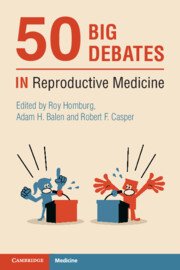Book contents
- 50 Big Debates in Reproductive Medicine
- Series page
- 50 Big Debates in Reproductive Medicine
- Copyright page
- Contents
- Contributors
- Foreword
- Introduction
- Section I Limits for IVF
- Section II IVF Add-ons
- Section III The Best Policy
- Section IV Embryology
- Section V Ethics and Statistics
- 30A Sex Selection Should Be Permitted for Family Balancing
- 30B Sex Selection Should Be Permitted for Family Balancing
- 31A Reproductive Medicine Should Be Publicly Funded
- 31B Reproductive Medicine Should Be Publicly Funded
- 32A Gamete Donation Should Be Anonymous
- 32B Gamete Donation Should Be Anonymous
- 33A Uterus Transplantation Is a Step Too Far
- 33B Uterus Transplantation Is a Step Too Far
- 34A Meta-analysis Should Not Be Considered Class A Evidence
- 34B Meta-analysis Should Not Be Considered Class A Evidence
- Section VI Male-factor Infertility
- Section VII Genetics
- Section VIII Ovarian Stimulation
- Section IX Hormones and the Environment
- Index
- References
34B - Meta-analysis Should Not Be Considered Class A Evidence
Against
from Section V - Ethics and Statistics
Published online by Cambridge University Press: 25 November 2021
- 50 Big Debates in Reproductive Medicine
- Series page
- 50 Big Debates in Reproductive Medicine
- Copyright page
- Contents
- Contributors
- Foreword
- Introduction
- Section I Limits for IVF
- Section II IVF Add-ons
- Section III The Best Policy
- Section IV Embryology
- Section V Ethics and Statistics
- 30A Sex Selection Should Be Permitted for Family Balancing
- 30B Sex Selection Should Be Permitted for Family Balancing
- 31A Reproductive Medicine Should Be Publicly Funded
- 31B Reproductive Medicine Should Be Publicly Funded
- 32A Gamete Donation Should Be Anonymous
- 32B Gamete Donation Should Be Anonymous
- 33A Uterus Transplantation Is a Step Too Far
- 33B Uterus Transplantation Is a Step Too Far
- 34A Meta-analysis Should Not Be Considered Class A Evidence
- 34B Meta-analysis Should Not Be Considered Class A Evidence
- Section VI Male-factor Infertility
- Section VII Genetics
- Section VIII Ovarian Stimulation
- Section IX Hormones and the Environment
- Index
- References
Summary
Judgments about evidence and the resulting recommendations in healthcare are complex, especially in rapidly evolving fields such as reproductive medicine. Case reports have transformed the treatment of infertility from the first reported case of successful IVF, through ICSI and PGD to uterine transplantation, and in many of these cases there is no need to conduct a prospective trial. Indeed, in many cases it would be impossible or unethical (1). However, there are many interventions where the benefit, if any, is less clear. Recent examples in the treatment of infertility are the use of endometrial scratching or the use of PGT-A in IVF where initial enthusiasm has ultimately been replaced with disappointment. The reason for this change is the inherent bias (both known and unknown) in lower evidence level studies – such as cohort studies or ‘big data’ studies where the different interventions compared are often applied to groups with different prognostic profiles.
- Type
- Chapter
- Information
- 50 Big Debates in Reproductive Medicine , pp. 175 - 178Publisher: Cambridge University PressPrint publication year: 2021

